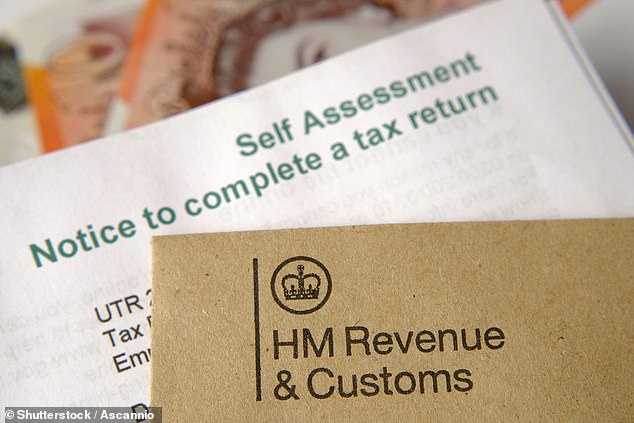I had some shares in investment trusts outside an ISA and sold them all in March, so I could withdraw my profits before the capital gains tax deduction was reduced.
The capital gains tax allowance was £6,000 last year, so my profit of £5,980 is below this.
I also received £800 in dividends from my holdings, which is down from last year’s £1,000 dividend allocation.
Do I have to declare them in my self-assessment tax return or do I only enter the amounts that exceed the thresholds?
It seems to indicate that I don’t have to report capital gains, but I do have to report dividends. Why would that be?
Tax reporting: Do I need to report my dividend and capital gains income to HMRC if they are below the thresholds?
This Is Money’s Angharad Carrick responds: Filing a self-assessment tax return can be very confusing and frustrating.
Generally, anyone who receives income that is not subject to tax at source, such as PAYE, must complete a tax return.
Typically these are small business owners and sole traders, but also include those who receive income from other sources, such as dividends.
In your case, you receive income from your dividends and have also made some capital gains after selling your shares in investment trusts.
This means that you could be required to pay taxes on that income and therefore file a self-employment tax return. However, as you say, certain thresholds must be met before that income is taxed.
When to declare dividend income
You do not have to pay any tax on dividend payments you receive below the threshold that applies to the tax year.
In your case, you sold your investments last tax year when the threshold was £1,000, meaning the £800 you received will not be taxable.
However, those who receive dividend payments above the threshold, which has been reduced from £1,000 to £500 this tax year, will have to pay tax.
If your dividend income is greater than your personal allowance (which also takes into account all your other taxable income) plus your tax-free dividend allowance, you will pay dividend tax according to your income tax band.
Dividend tax rates are currently 8.75 percent for basic rate taxpayers, 33.75 percent for higher rate taxpayers and 39.35 percent for additional rate taxpayers.
If you hold your stocks and shares investments in an ISA, you won’t have to worry about paying tax on dividend payments on shares, investment trusts, funds and ETFs, because they are in a tax-free wrapper.
The key question, however, is whether you have to declare your dividends even if you don’t reach that threshold.
Someone who is employed and paid via PAYE and who exceeds the dividend limit will obviously need to complete a self-assessment tax return and include the dividend income.
However, it is a little more complicated for those who are close to reaching the threshold and for those who regularly file self-assessed tax returns for other reasons.
I’m not sure if you already file a tax return, but if you do, you will need to report dividends even if they are below the dividend allocation.
This will be part of the income section and should say that you received £800 in dividends last tax year.
However, if you are paid via PAYE, you may not have to file a tax return, because your dividends do not reach that threshold.
There are many rules that will affect you depending on your personal circumstances.
I’m not sure about your specific situation other than that you’ve made some progress and while there are general rules, if you have any doubts you should contact HMRC.
Chris Springett, private client tax partner at Evelyn Partners, says: The income tax and capital gains tax sections of a return are separate.
When you complete a tax return, then you must include on it all income that is “taxable.”
This is income that could be taxable even if the amount of the income is less than a deduction, such as dividends. The only income you can leave out is income that is completely exempt from tax regardless of the amount, such as income from an ISA.
This is partly because their total taxable income, which includes dividends, affects their entitlement to certain tax reliefs, including the personal tax relief and the personal savings tax relief, but not the dividend relief.
Dividends must be included on your tax return, but because the dividend deduction will be applied, you will not actually be taxed on them.
When to declare capital gains income
When it comes to capital gains, the picture is a little more complicated.

Chris Springett explains the rules for dividend and capital gains taxes
You must declare your capital gains if they exceed the £3,000 or, where applicable, £6,000 threshold, because the gains were made in the last tax year before the threshold was reduced.
You will also need to declare any capital gains on your tax return if your sales revenue exceeds £50,000, even if your profits are less than the annual exempt amount.
You will not need to complete a tax return if your main capital gains disposal is from your home because the main residence relief is applied to the full amount.
Those who have sold land or property other than their main residence may need to report it to HMRC on a separate 60-day reporting form and pay within that period from the date of completion.
You will need to report the disposition even if you intend to submit a self-assessment form later in the year.
However, there is an exception if the tax return is filed before the 60-day filing deadline, or when the self-assessment deadline falls before the 60-day deadline.
Angharad Carrick says: If you have not yet filed a tax return, you will need to file online.
You must inform HMRC by 5 October if you need to complete a tax return and have not submitted it before. You will need to submit the application online.
The deadline to file a paper return is October 31, 2024, and January 31 if you file online.
Some links in this article may be affiliate links. If you click on them we may earn a small commission. This helps us fund This Is Money and keep it free to use. We do not write articles to promote products. We do not allow any commercial relationships to affect our editorial independence.

